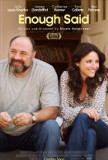Enough Said (United States, 2013)
September 27, 2013
Enough Said is a maddeningly uneven dramatic comedy from writer/director Nicole Holofcener, whose previous efforts have shared the tone and a few of the themes with this one. The film's dramatic underpinning and the way it addresses impending empty nest syndrome are solid but the comedy varies from mildly amusing to achingly awful. Often, in trying too hard to get laughs, Holofcener's screenplay takes an artificial turn. There are times when it's as if leads Julia Louis-Dreyfus and the late James Gandolfini are in different films, with Dreyfus mugging for the camera to get laughs while Gandolfini creates a deeply sympathetic portrayal. The jarring shifts between effective drama and failed humor make watching Enough Said a bumpy and sometimes frustrating journey.
Dreyfus never seems right for the part. She constantly tries to play for laughs and rarely gets them. As a result, her Eva turns into a caricature. And she's not just a comically over-the-top creation; she's unpleasant and self-centered. The other older women in the film - Catherine Keener's Marianne and Toni Collette's Sarah - suffer similar fates; they're underdeveloped and come across as grasping and shallow. That's surprising when one considers that, in her previous work like the criminally underrated Lovely & Amazing, Holofcener's strength has been crafting well-rounded female characters. Here, the only two genuine human creations are Gandolfini's Albert and Tracey Fairaway's Ellen (Eva's daughter). For one of his last performances, it's refreshing to see Gandolfini far from the tough guy role. Albert is open and vulnerable and the actor's work here reminds us that Gandolfini had tremendous range that the Tony Soprano typecasting often restricted him from displaying.
The film's central conceit is right out of sit-com central. Eva, a divorcee who's about to lose her daughter to college embarks upon a tentative relationship with Albert, a man who's in a similar situation. The "twist" is that Eva, a masseuse, has a new client named Marianne, with whom she becomes friendly. During the course of their sessions, Marianne often speaks disparagingly about her ex-husband who Eva eventually realizes to be Albert. Of course, Eva feels the contrived need to keep the truth from her new pal (presumably because she's embarrassed). She's also mum to her boyfriend that she knows his former wife. Obviously, everything builds to the big "reveal," which turns out to be the least convincing and most disappointing moment in Enough Said.
The movie contains some big strengths, however. In addition to Gandolfini's fine performance, Holofcener's screenplay addresses in a sensitive and credible manner the difficulty parents can have letting go. Both Eva and Albert are facing the same situation: beloved daughters flying the coop. Most movies about kids going to college address the subject from the perspective of the younger generation; Enough Said provides something a little different. Also, we are presented with an illustration of how different people can have seemingly incompatible points-of-view about the same individual. Eva and Marianne both know Albert intimately, yet their impressions are diametrically opposed.
The biggest problem with Enough Said is that Holofcener doesn't trust the material enough to allow the humor to evolve naturally. Perhaps this has something to do with using Dreyfus but, by forcing the issue and going for "big" laughs, she undermines some of the movie's stronger points. There are good things to say about Enough Said and reasons to see it, but the flashes of insight don't overcome structural weaknesses that consign the end result to the pit of autumnal mediocrity.
Enough Said (United States, 2013)
Cast: Julia Louis-Dreyfus, James Gandolfini, Catherine Keener, Toni Collette, Ben Falcone, Tracey Fairaway, Eve Hewson, Tavi Gevinson
Screenplay: Nicole Holofcener
Cinematography: Xavier Perez Grobet
Music: Marcelo Zarvos
U.S. Distributor: 20th Century Fox
U.S. Release Date: 2013-09-27
MPAA Rating: "PG-13" (Sexual Content, Profanity)
Genre: COMEDY/DRAMA
Subtitles: none
Theatrical Aspect Ratio: 1.85:1

Comments